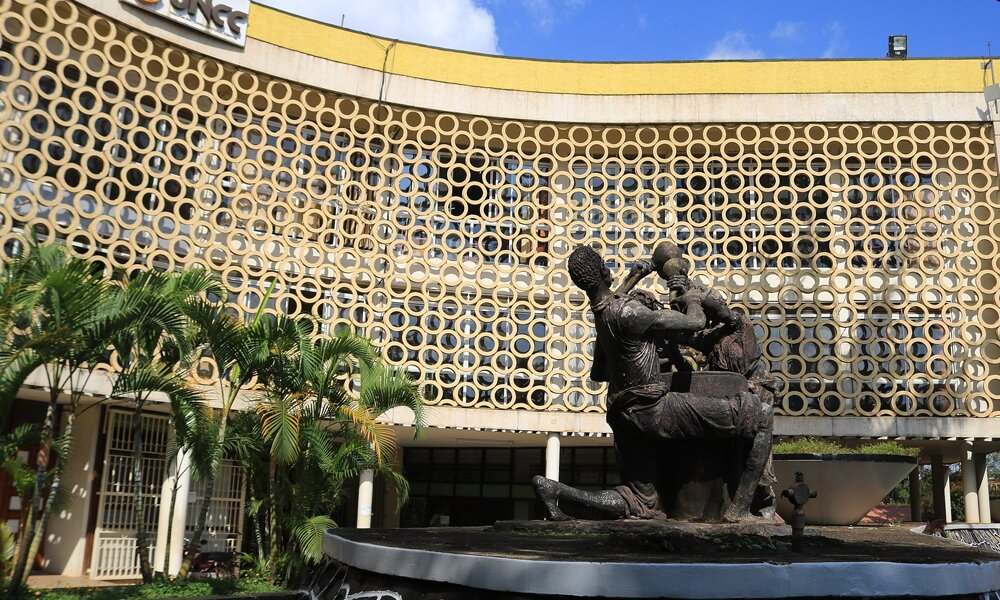The Uganda National Cultural Centre (UNCC), a leading cultural advocate, is launching a nationwide regional cultural centre plan. Decentralising culture and arts will give Ugandans from all regions access to cultural resources, talent development, and economic empowerment through the creative industries.
Historical Background of UNCC
Under the Uganda National Cultural Centre Act of Parliament, the UNCC opened on December 2, 1959. The National Theatre, a Kampala landmark for stage and film performances, and the Nommo Gallery, which displays local and international visual arts, are located at Said Barre Avenue and De Winton Street. The UNCC is governed by an eight-member board nominated by the Minister, led by Prof. Okaka Opio Dokotum. It hosts weekly events like Monday Jam Sessions, Tuesday dance lessons, Wednesday movie nights, and Thursday comedy shows. Annual activities like the UNCC Arts & Culture Festival, World Theatre Day, and World Music Day enhance its cultural conversation and interaction.
The Need for Regional Centers
Uganda has several arts, languages, and customs from Busoga, Buganda, Kigezi, Karamoja, Lango, and Acholi regions. Many are under-represented and geographically separated from dominant cultural narratives despite their deep cultural traditions. Kampala’s cultural centralisation has denied indigenous artists access to facilities and audiences. Regional centres could solve these problems by discovering talent, creating jobs, preserving culture, promoting economic growth, and ensuring equal cultural participation.
Strategic Rollout Plan
Regional centre development began in the early 2010s. For UGX 90 billion, UNCC adopted a strategic plan to develop nine regions by 2014. A phased deployment included the 2018 opening of the Kigezi pilot centre in Kisoro with the Mghahinga Cultural and Crafts Centre. Cultural preservation, tourism, and community crafts are integrated in this centre. In 2020, four flagship hubs were announced for Masaka (Central), Kisoro (West), Gulu (North), and Mbale (East) to focus on land acquisition, staffing, and program management.
Design and Features of Regional Centers
Each regional hub would replicate UNCC’s Kampala campus with a cinema and theatre for performances, art galleries for regional artists, crafts markets, artist training and rehearsal spaces, and digital archives for oral histories and customs. Collaboration with Makerere University’s Music, Dance, and Drama faculty should enhance these centres. UNCC board chairman Sam Kelo Okello said the design promotes talent, creates jobs, and boosts regional economies by bringing theatre to people.
Lessons from the Kigezi Pilot Center
The Kigezi centre exemplifies cultural-economic integration. The pilot at the Mghahinga Cultural and Crafts Centre promotes community wealth through festivals, crafts, and performances through cultural conservation and tourism. It offers unique programming like bicycle routes that combine art, recreation, and conservation to create young jobs in cultural value chains.
Funding and Resources
The expected decentralisation project budget is UGX 90 billion, funded by government appropriations, UNCC event earnings, and private contributions. International cultural agencies and developmental partners should provide funds to ensure efficient resource flow for regional centre phased implementation.
Challenges and Opportunities
Maintaining vibrancy, funding, efficient building, finding qualified regional managers, and reconciling national cultural aspirations with local traditions are major problems for the expansion. There are many potential to boost youth employment, cultural tourism, indigenous heritage, regional identity, and creative industries like music, crafts, dance, storytelling, and film.
FAQ
The Uganda National Cultural Centre is what?
The Uganda National Cultural Centre, a statutory entity, runs Kampala’s cultural venues to preserve and promote Uganda’s heritage.
Why is UNCC creating regional centers?
Regional centres are being established by UNCC to decentralise cultural activities, ensure equal access to cultural resources, and empower local people economically through arts.
How many regional centers are planned?
UNCC wants to open nine regional centres in Uganda to reflect local culture.
These regional centres will have what?
The centres will promote local talent and culture with theatres, art galleries, crafts markets, training spaces, and digital archives.
WHO runs Uganda National Cultural Centre?
The UNCC is managed by Prof. Okaka Opio Dokotum and governed by an eight-member board nominated by the Minister of Gender, Labour, and Social Development.
What distinguishes Kigezi pilot centre?
The Kigezi experiment combines cultural conservation, tourism, community crafts, and innovative programming to inspire regional centres.



